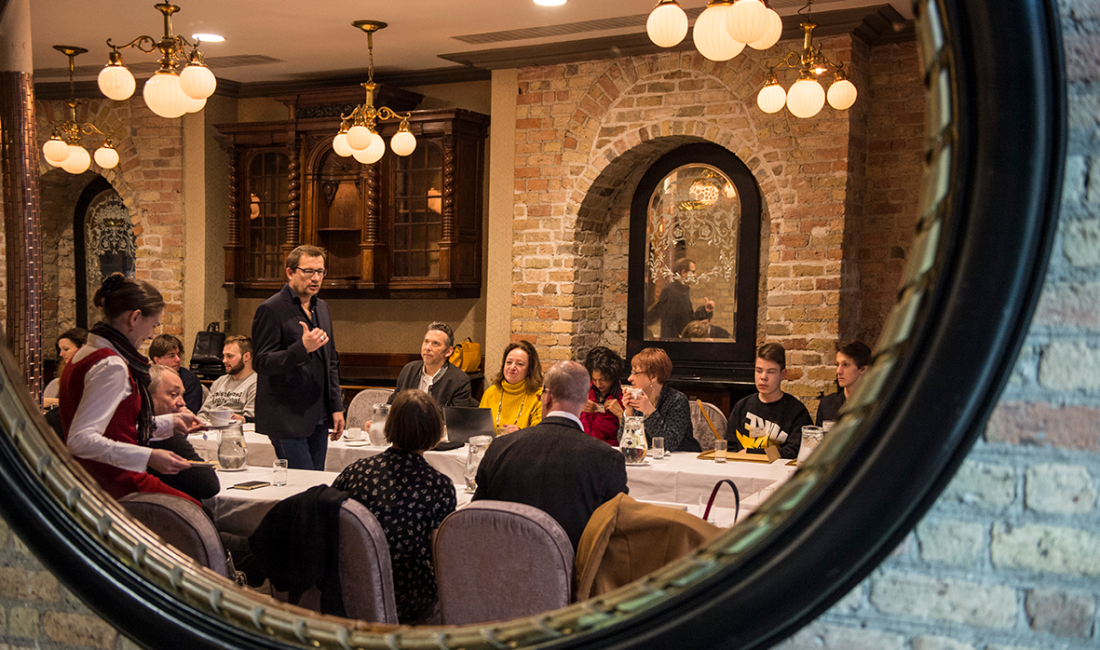Democracy International, on behalf of Mehr Demokratie, organised a study trip to Dublin from 23-25 January for 23 interested activists and professionals. Across three days, we met with leading experts and stakeholders of the Irish Citizens’ Assembly and Constitutional Convention. They shed some light on the legal, administrative and political perspectives of organizing and running a multi-step citizen participation process, such as the Citizens’ Assembly.
Former Prime Minister Enda Kenny, who was prime minister at the time the Constitutional Convention was established in 2012, addressed the participants at the outset of the three-day tour. Mr. Kenny spoke to us about the state of affairs of Ireland at the time of the economic crisis, and the outcry for more citizen participation and transparency in decision-making that followed it. The public pressure was there, but more importantly, the political will was there.
David Farrell, considered the architect behind the process, shared the academic perspective on citizens’ assemblies and showed how people’s attitudes towards certain issues change with growing political knowledge and civic education. The path toward the original Constitutional Convention was also cleared by the lobbying work of a democratic participation project that travelled Ireland called We The Citizens, which was run by Farrell and Jane Suiter. We The Citizens served as a test round before the institutionalised Constitutional Convention.
The 2012 Constitutional Convention was composed of 66 randomly-selected citizens, representative of Ireland's demographic make-up, 33 politicians and 1 chairman. Some of the most controversial topics in Irish society were debated across 9 weekends – such as marriage equality, Ireland’s blasphemy law, lowering the voting age, term limits, and voting rights for Irish citizens abroad. The Convention offered the unique possibility for citizens to co-create policy recommendations with their representatives on all selected topics. Presentations and interactions with an expert advisory group of academics, political scientists and constitutional lawyers informed their debates.
History was made when, for the first time ever, recommendations from such a body were pushed to a referendum and endorsed by the electorate. In May 2015, marriage equality became the law of the land.
The 2016 Irish Citizens’ Assembly that followed was also monumental. Consisting of 100 randomly-selected citizens this time, it was guided only by neutral facilitators and the members of the assembly found themselves in the role of decision-makers. They were responsible for making legislative recommendations on topics such as abortion, fixed-term parliaments, referendums, and climate change. An expert advisory board was available for the members to answer any of their questions and provide background on the topics. Before the two referendums on abortion and blasphemy took place, the recommendations of the Citizens’ Assembly were published so as to be reviewed by the Irish population.
The most controversial topic was abortion. Ireland had some of the strictest abortion laws in Europe and even Ireland’s top experts were sceptical that would change. In fact, it was arguably the recommendations of the assembly that drove the people to vote to seriously liberalise abortion laws in Ireland in last year’s obligatory constitutional referendum. 64% of the Citizens’ Assembly approved the final abortion recommendation text, followed by 66% of the Irish citizens who approved the same text in the referendum. That barely-there margin demonstrates that citizens’ assemblies can mirror the views of the overall society and that people put trust in their fellow citizens to come up with carefully considered recommendations when given the opportunity to become highly knowledgeable about certain subjects. When a group of random, everyday citizens come together to solve society’s most contentious questions, solutions can be proposed that depict the views of society as a whole.
The final day of our tour ended with a personal lunch with three real life members of the Citizens’ Assembly. After three long days learning the ins and outs of the process, and somewhat becoming mini-experts of the Irish example ourselves, sitting face-to-face with the citizens of the assembly felt like meeting Irish celebrities. It was a fascinating end to our trip to hear the first-hand experience of citizens that helped shape Ireland’s history. What we learned is that the Irish are very proud of their unique deliberative process of decision-making. The level of debate on participatory democracy has been raised to a new level, and it is due to the values of integrity, respect and authenticity embedded into the entire process that the Irish story can be considered a success.
Article photo courtesy of Jan Hagelstein




